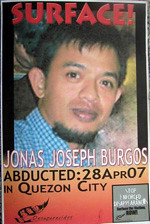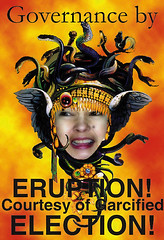Philippines’ image problem abroad
Ad Lib -- By Greg B. Macabenta
To say that the Philippines has "an image problem" abroad is an understatement. What we have is an image crisis. This has routinely been attributed to "unfair reporting" by the international media and "the endemic corruption" prevailing in our country. Thus, it is hoped that, with the Aquino presidency, the country now has "an opportunity to improve its image," subject only to "fair treatment" by media.
While this premise is partly correct, it is a rather simplistic viewpoint. The harsh fact is that, the best intentions of the new government and its most laudable acts will not necessarily be understood or appreciated overseas -- or even heard of. These things do not happen by accident.
The Philippines is seen through different prisms by its various external publics -- foreign governments, international organizations, businesses and prospective investors, human rights and other activist groups, foundations and funding institutions, the travel and tourism sector, the international media, and overseas Filipinos. These perceptions influence their attitude toward our country and the way they deal with us, including providing or withholding support.
In an environment where perception is often mistaken for reality, much of what these external publics think of the Philippines -- or think they know about our country -- is based on impressions gathered through the years, like plaque accumulating on unhealthy teeth.
The main sources of information are the diplomatic outposts and risk-assessment consultants, jaded investors, finicky foreign visitors, reports of the international press (including those of "parachute journalists"), satellite telecasts of GMA and ABS-CBN, and stories picked up from Manila media and recycled by overseas Filipino publications, plus the Internet and the social networks. All these serve to overwhelm the puny information efforts of the Philippine government.
Is it any surprise that what the overseas publics know about the Philippines ranges from unclear to unflattering? Even the most supportive of them, such as loyal overseas Filipinos, do not know enough about the Philippines.
It doesn’t help that Philippine government offices abroad lack materials and a central source of information, as well as the logistics for effective two-way communications with key publics.
Even in a premier post like the US, the information and communications function has been treated as a concurrent assignment by a consular officer in Washington DC and by the trade and tourism representatives in the consulates.
This was the case during the incumbency of Presidents Arroyo, Estrada, Ramos, and Cory Aquino. It would be unfortunate if this continues to be the case under P-Noy.
The Marcos government appreciated the importance of overseas information and communication but mishandled it anyway. While it had a Bureau of Foreign Information, its overseas staffers were drawn mainly from the Manila press -- people whose skills were in writing and reporting the news, rather than in Communications Management.
This was one reason why presidential brother-in-law and Philippine ambassador to Washington Kokoy Romualdez arranged to include heads of leading advertising and PR agencies in Manila (myself included) in the advance party for Marcos’s state visit to the US in 1982. Our job, we were told, was to field questions from the hostile US media. Romualdez did not think his information officers could handle them. Of course, at that point, neither could the advertising and PR specialists. No amount of deodorizing could cover up the stink in the Marcos dictatorship.
But what surprised us was the gross ignorance of many American journalists about the Philippines, beyond their familiarity with the horror stories. I don’t think that situation has improved to this day.
There should be no doubt that a positive perception of the new government and its policies and programs is urgently needed to attract investments and international aid, nurture foreign relations, and rally overseas Filipinos to the cause of the Motherland. This makes it imperative for P-Noy and his communications team to seriously consider setting up a competent overseas information and communications operation -- conceptually, a Bureau of Overseas Information and Communication -- to undertake the following:
- Keeping the government’s various external publics properly, accurately, and continuously informed of policies, programs, and developments in the Philippines under the new government.
- Securing accurate and continuing feedback from these publics to serve as basis for plans and policy formulation.
- Developing and sustaining a positive image of the new government and, by extension, the Philippines and the Filipino people; in the process, helping gain support for the government’s socio-economic initiatives; and enhancing our country’s stature in the international community.
- Managing the perceptions and attitudes of the various publics in the face of negative or sensitive developments affecting our country.
For starters, a comprehensive strategy document must be prepared, setting specific objectives, identifying key target publics, and providing implementation, monitoring and feedback details.
Secondly, two-way channels of communication have to be established with the various overseas publics, to ensure a constant and controlled flow of information and feedback. Emphasis on constant and controlled.
An absolute necessity is a credible and regularly updated database on the Philippines, provided to international media, overseas Filipino media, key offices of foreign governments and international bodies, and other sectors of influence (chambers of commerce, the academe, think tanks, foundations and funding institutions), to serve as reference for properly evaluating Philippine issues, concerns and opportunities.
Other key functions would be producing and maintaining proprietary information and communications vehicles, such as newsletters and periodicals, radio and TV programs and special reports, blogs and Web sites, etc.; coordinating Philippine government participation in international events and activities requiring the preparation and distribution of special information materials; and undertaking special information and communications operations to address critical issues and situations affecting the interests of the Philippine government. The last, of course, includes crisis PR.
Needless to say, the nature of this job will require a team of professionals who are skilled not only in journalism, editorial writing and press relations, but also in marketing and the corollary disciplines of advertising, promotions and public relations in its various aspects, including community relations. In other words, a team skilled in Communications Management.
I must admit that it was in a moment of patriotic fervor that I decided to write down these thoughts. I had just been to Manila to attend the inauguration of P-Noy and to speak at a conference of the Overseas Filipinos for Good Governance and, like the other delegates, I was gung ho for the old country.
I passed on the paper to some friends who have access to the new leadership, hoping that it would merit some attention. Unfortunately, no one has acknowledged receipt of it. I guess folks are too busy with more important matters.
That’s too bad, because, like it or not, the proper handling of overseas information and communication is an important matter, too. I just hope it won’t take a PR crisis for our new leaders to realize that.
gregmacabenta@hotmail.com
******************************************************************************** Emerito F. Salud - A lawyer from the Ateneo law School ' 73, a member of the NY Bar since 1994, a FILAM community activist, a radio-commentator of RadioPinoy USA, he is currently the Director for Advocacy of NaFFAA REgion 1. He is also a member of the NJ Chapter-Movement for Free Philippines, founded by the late Senator Raul Manglapus, and a founding member of Kaibigan Inc., based at the Port of Newark, NJ, a support group for Filipino merchant mariners (seamen).
Emerito F. Salud - A lawyer from the Ateneo law School ' 73, a member of the NY Bar since 1994, a FILAM community activist, a radio-commentator of RadioPinoy USA, he is currently the Director for Advocacy of NaFFAA REgion 1. He is also a member of the NJ Chapter-Movement for Free Philippines, founded by the late Senator Raul Manglapus, and a founding member of Kaibigan Inc., based at the Port of Newark, NJ, a support group for Filipino merchant mariners (seamen).
POGB will not sell, exchange, use or allow any 3rd party access to your email for
any other purposes without exception, email exclusively for article updates only.
























0 Speak Out:
Post a Comment